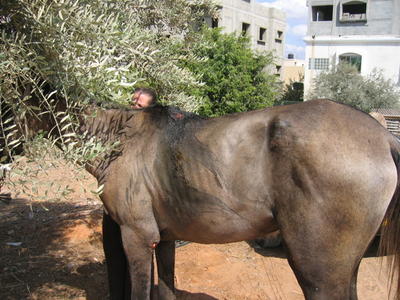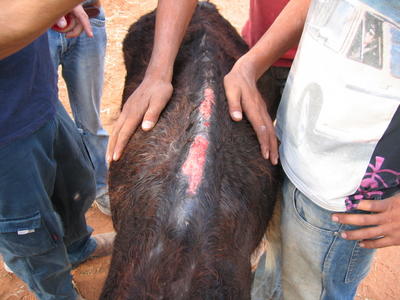Earlier this year, the people who run Safe Haven for Donkeys in the Holyland decided to extend a helping hoof beyond the borders of their shelter and to reach out to the donkeys and horses working in the fields and villages. So two months ago, SHADH built a shelter in Tayibeh, a nearby Arab village, and they started showing up every Tuesday with a vet, a farrier, and volunteers. The locals were invited to bring their donkeys and horses for medicine, vitamins, hoof treatment/reshoeing, and harness repair or replacement — all free. Hay and clean water were freely available. The simple but sturdy shelter featured signage in Arabic and English, three bathtubs for drinking water, and a bulletin board with photos of local kids and Koran passages about kindness to animals. Though each week they'd return to find the tubs filled with sand and the decorations torn down, their vet, Pierre, says the problems he treats have become less severe and traumatic.
Last Sunday, someone demolished the shelter with a bulldozer. Evidence points strongly to the local Arab vet, who was offended that he'd been cut out of the deal and had threatened before a crowd of witnesses to destroy the shelter. The razing was so thorough that of all the construction materials, only the tubs are salvageable. The family living across the street from the former shelter site was receiving $100 a week for general cleanup and oversight, but they claim not to have seen the destruction.
Two days later, the Safe Haven crew showed up again anyway, hay and water and volunteers and French vet in tow, and they treated eight or nine animals -- down from the usual dozen. Instead of gathering under the shelter's shade, they treated the animals in the shade of olive and ficus trees throughout the adjacent lot. Injuries ranged from minor inflammation of the fetlock to a stomach-churning abrasion at the crown of a horse’s back, where a poorly fitted saddle has worn away all the skin and exposed the fat layer.

Note the dark area behind the shoulders and the dark grease stains running down the fur. An injury of this magnitude would land a human in an emergency ward. Yet the owner is still riding and working the horse, which by the way doesn’t have much fat to comprise a layer. Note ribs.

Hobbling the horse to immobilize him for medical treatment. When the revolted vet had finished applying a salve to the area, he handed the rest of the tube to the owner (seen at left in baseball cap), who hefted it and said, "It's empty!"

This is not the horse. This donkey, however bloody and brutalized, is in great shape compared to the horse. Most of the donkeys had bloody sores and a general lack of spirits, but only this one showed an entire spine rubbed raw by, again, ill-fitting gear.
At the very least, they all spent some time in the shade eating hay and not working. It's a far cry from the bucolic playground at SHADH, but it's something.
So now the story of the Tayibeh outreach is no longer a simple heart-warming tale of crazy foreigners obsessed with animals. There’s intrigue and police reports, good guys and bad guys, and an animal-loving local who’s offered his side-yard to replace the demolition site.
Muhammad, a kindly man with a face very like a sheep's, wears a typically Israeli "tembel" hat. He raises rabbits and doves in adjacent hutches, half a dozen sheep, numberless exotic chickens, and a small flock of black turkeys in an enormous yard shaded by tropical fruit trees. He raises the sheep for fun, he says, but then slaughters them: "What else would I do?" He says he never eats anything he's grown himself. In a shady corner of the yard where chickens and sheep gambol all the live long day, he keeps a small nervous dog in a cage that would be confining for a rabbit, because "he makes trouble." The skinny little thing, all of six months old, was happy to lean against my hand and feel a pulse. Muhammad says he lets the dog out at night.

Muhammad and his prized doomed sheep.
Earlier, Muhammad's neighbor had promenaded over to the Shadh site to show off his very personable exotic goat. It was distinguished by a complicated udder and a nose that might be called comically aquiline. He was so proud of her, it pained him to see me photographing her attached to a common rope. Someone had made off with her more attractive leash, so he finally set his quarter-Syrian beauty free to ensure the photos presented her with becoming dignity. She was very attached to him and didn't wander far.

I offered to email him some images, but getting the email address was incredibly difficult. For starters, only Muhammad has email, which is okay because they're neighbors. But then Muhammad handed me the phone to speak with his daughter, who kept saying "M" -- or was it "N"? The simple "M as in Mary or N as in Nancy" routine we do in English-speaking countries only complicated matters. Maybe because I kept saying "N as in Natz-ret [Nazareth] or M as in Muhammad?" It took five minutes to get the email. Mercifully, it's a Hotmail address. I don't know if I could have handled any more challenges on the right side of the "streudel." (Streudel: a rolled-up pastry (@).)
There is no simple resolution to the Tayibeh situation, or to the problem of animal cruelty, especially in a poor society, or beyond that, to the problem of Arabs and Jews working (or not) together. SHADH's Tayibeh outreach might seem like a model for cooperation, but deepset distrust, entitlement, and cultural differences undermine progress. Given free vet care, the locals want a landscaped park like the one Coca-Cola recently built. Meanwhile, SHADH employs two Arabs and a Thai worker, and they're soldiering on to improve life for the animals ... whether the bipeds help or not.
*

No comments:
Post a Comment